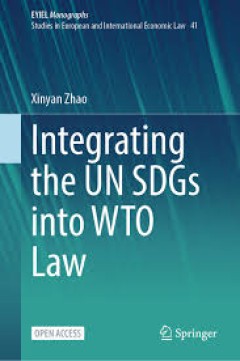Filter by

Social Determinants of Health in Non-communicable Diseases : Case Studies fro…
This book is open access under a CC BY-NC-ND 4.0 license. This open access book is the first compilation that reviews a wide range of social determinants of health (SDHs) for non-communicable diseases (NCDs) and healthy ageing in Japan. With the highest life expectancy and the largest elderly population in the world, Japan has witnessed health inequality by region and social class becoming…
- Edition
- -
- ISBN/ISSN
- 978-981-15-1831-7
- Collation
- XI, 328
- Series Title
- Springer Series on Epidemiology and Public Health (SSEH)
- Call Number
- 362 SOC

Integrating the UN SDGs into WTO Law
This is an open access book. Sustainable development is so important that humanity must do its utmost to achieve these goals for the well-being of the present and future generations. WTO members have started to reform WTO rules since the WTO’s Buenos Aires Ministerial Conference in 2017. The book describes a possible bright future for readers: WTO members can integrate the UN SDGs into WTO la…
- Edition
- -
- ISBN/ISSN
- 978-3-031-73876-0
- Collation
- XVIII, 293
- Series Title
- European Yearbook of International Economic Law (EUROYEAR, volume 41)
- Call Number
- 340 ZHA i

Data Protection without Data Protectionism : The Right to Protection of Perso…
This open access book offers a new account on the legal conflict between privacy and trade in the digital sphere. It develops a fundamental rights theory with a new right to continuous protection of personal data and explores the room for the application of this new right in trade law. Replicable legal analysis and practical solutions show the way to deal with cross-border data flows without vi…
- Edition
- -
- ISBN/ISSN
- 978-3-031-19893-9
- Collation
- XVI, 431
- Series Title
- European Yearbook of International Economic Law (EUROYEAR, volume 28)
- Call Number
- 340 NAE d

Sustainable Commodity Use : Its Governance, Legal Framework, and Future Regul…
This open access book examines the governance and legal landscape of the global commodity sector. For that purpose, the author conceptualises both Global Commodity Governance (GCG) as well as Transnational Commodity Law (TCL). He defines the key terms of Global Commodity Governance, delineates the underlying legal framework of Transnational Commodity Law, and assesses the effectiveness of Trans…
- Edition
- -
- ISBN/ISSN
- 978-3-030-89496-2
- Collation
- XVII, 307
- Series Title
- European Yearbook of International Economic Law (EUROYEAR, volume 21)
- Call Number
- 340 OEH s

Public Actors in International Investment Law
This open access book focuses on public actors with a role in the settlement of investment disputes. Traditional studies on actors in international investment law have tended to concentrate on arbitrators, claimant investors and respondent states. Yet this focus on the “principal” players in investment dispute settlement has allowed a number of other seminal actors to be neglected. This boo…
- Edition
- -
- ISBN/ISSN
- 978-3-030-58916-5
- Collation
- X, 199
- Series Title
- European Yearbook of International Economic Law (EUROYEAR)
- Call Number
- 340 PUB

Reality Lost: Markets of Attention, Misinformation and Manipulation
This open access book looks at how a democracy can devolve into a post-factual state. The media is being flooded by populist narratives, fake news, conspiracy theories and make-believe. Misinformation is turning into a challenge for all of us, whether politicians, journalists, or citizens. In the age of information, attention is a prime asset and may be converted into money, power, and influ…
- Edition
- 1
- ISBN/ISSN
- 9783030008130
- Collation
- XXII, 144hlm; ill., lamp.,
- Series Title
- -
- Call Number
- -

Social Innovation in Higher Education : Landscape, Practices, and Opportunities
This open access book offers unique and novel views on the social innovation landscape, tools, practices, pedagogies, and research in the context of higher education. International, multi-disciplinary academics and industry leaders present new developments, research evidence, and practice expertise on social innovation in higher education institutions (HEIs), across academic and professional di…
- Edition
- -
- ISBN/ISSN
- 978-3-030-84044-0
- Collation
- X, 313
- Series Title
- Innovation, Technology, and Knowledge Management (ITKM)
- Call Number
- 370 SOC

The Life and Afterlife of Gay Neighborhoods
This open access book examines the significance of gay neighborhoods (or ‘gayborhoods’) from critical periods of formation during the gay liberation and freedom movements of the 1960s and 1970s, to proven durability through the HIV/AIDS pandemic during the 1980s and 1990s, to a mature plateau since 2000. The book provides a framework for contemplating the future form and function of gay nei…
- Edition
- 1
- ISBN/ISSN
- 978-3-030-66073-4
- Collation
- oer.unej.ac.id
- Series Title
- The Urban Book Series
- Call Number
- 307

Sustainable Development in the Jordan Valley : Final Report of the Regional N…
This book summarizes the NGO Master Plan that provides a comprehensive program to rehabilitate the Lower Jordan River and its tributaries in Jordan, Israel and Palestine. It is a regional and civil society effort designed to promote the restoration of the valley’s environmental and ecological values within a realistic financial and economic framework. The plan identifies 127 specific regional…
- Edition
- -
- ISBN/ISSN
- 978-3-319-30036-8
- Collation
- XLII, 239
- Series Title
- Hexagon Series on Human and Environmental Security and Peace (HSHES, volume 13)
- Call Number
- 338.1 KOO s

The Barcelona School of Ecological Economics and Political Ecology : A Compan…
In this open access book, ecological economics and political ecology traditions converge into a single academic school. The book constitutes a common ground where multiple and critical voices are expressed, covering a broad scope of urgent matters at the crossroad between society, economy and the natural environment. The manuscripts composing this compendium offer appealing material for both ex…
- Edition
- -
- ISBN/ISSN
- 978-3-031-22566-6
- Collation
- XXV, 400
- Series Title
- Studies in Ecological Economics (SEEC, volume 8)
- Call Number
- 333 BAR
 Computer Science, Information & General Works
Computer Science, Information & General Works  Philosophy & Psychology
Philosophy & Psychology  Religion
Religion  Social Sciences
Social Sciences  Language
Language  Pure Science
Pure Science  Applied Sciences
Applied Sciences  Art & Recreation
Art & Recreation  Literature
Literature  History & Geography
History & Geography